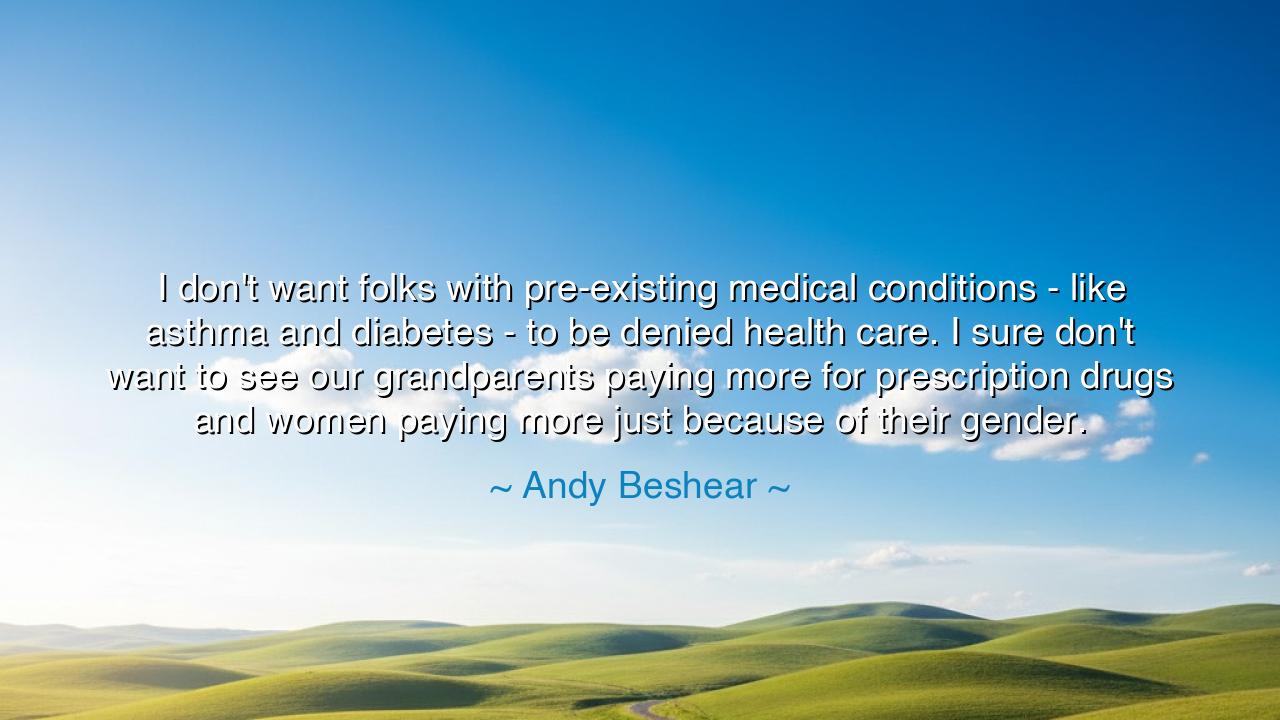
I don't want folks with pre-existing medical conditions - like
I don't want folks with pre-existing medical conditions - like asthma and diabetes - to be denied health care. I sure don't want to see our grandparents paying more for prescription drugs and women paying more just because of their gender.






The words of Andy Beshear echo like a cry of justice across the ages: "I don't want folks with pre-existing medical conditions — like asthma and diabetes — to be denied health care. I sure don't want to see our grandparents paying more for prescription drugs and women paying more just because of their gender." This is not merely the utterance of a modern leader; it is the voice of compassion clothed in the armor of moral conviction. It speaks of the eternal struggle between greed and grace, between the cold arithmetic of profit and the warm pulse of human dignity. It reminds us that the worth of a society is not measured by its wealth, but by how it tends to the frail, the aged, and the forgotten.
In ancient times, the wise elders taught that the health of one is bound to the health of all. The healer of the village did not ask whether a sufferer could pay in coin, but whether the wound could be healed. So too does Beshear’s message recall that sacred duty: that health care is not a privilege bestowed by rulers, but a right woven into the very fabric of human fellowship. When he speaks of those with pre-existing conditions, he invokes the principle that none should be cast aside for the frailties of their flesh — for illness is no sin, and suffering no shame.
Consider the story of Florence Nightingale, the “Lady with the Lamp,” who walked among the dying soldiers in the Crimean War. The battlefield did not discriminate; neither did she. Amid the stench and groans of the wounded, she tended the sick without thought of rank or wealth. Her lamp shone as a symbol of mercy and equality — that all, even the most broken, deserve care. In her, we see the living embodiment of Beshear’s creed: that the measure of leadership is mercy, and that to heal the body of the nation, one must first care for its weakest parts.
The mention of grandparents paying more for prescription drugs touches the ancient chord of filial duty. In every civilization worthy of remembrance, the elders were honored, not burdened. The Greeks built temples to Athena, goddess of wisdom, for they knew that wisdom is carried in wrinkled hands and trembling voices. To make the elderly choose between medicine and sustenance is to forsake the sacred bond between generations. Beshear’s plea reminds us: the young are the strength of the nation, but the old are its soul. To neglect them is to tear at the roots from which our future grows.
And when he speaks of women paying more because of their gender, he names a wound as old as civilization itself — the injustice that has shadowed half of humankind. From the marketplaces of Babylon to the hospitals of the present age, women have borne burdens unseen and unpaid. Yet, the mark of progress is the lifting of such yokes. A society that values its mothers, daughters, and sisters equally in all things — even in the care of the body — draws nearer to the divine ideal of justice. To discriminate in health is to declare that some lives are worth more than others. That is a poison more deadly than any disease.
Let it be known, then, that the words of Beshear are not mere policy but prophecy. They remind us that compassion must be codified, that empathy must have structure, that mercy must walk in the form of law. It is not enough to feel sorrow for the sick; we must build systems that protect them. Just as the architects of old built aqueducts to bring water to the thirsty, we must forge institutions that bring healing to all — regardless of wealth, gender, or condition.
The lesson, my friends, is clear: justice begins not in courts but in hearts. To deny care to one is to deny humanity to all. Therefore, let each of us be guardians of mercy in our own sphere. Help the sick. Defend the weak. Speak when silence serves cruelty. Vote for those who uphold the dignity of every life, and give freely when another’s burden is heavier than your own. For the strength of a people is measured not by their riches, but by the kindness they extend to those who have none.
Thus the teaching ends as it began — with a cry for compassion. May we remember, in the quiet of our days, that every act of care is a thread in the great tapestry of humanity. And when future generations ask who we were, let them say: They were the healers, the defenders, the ones who chose love over indifference.






AAdministratorAdministrator
Welcome, honored guests. Please leave a comment, we will respond soon